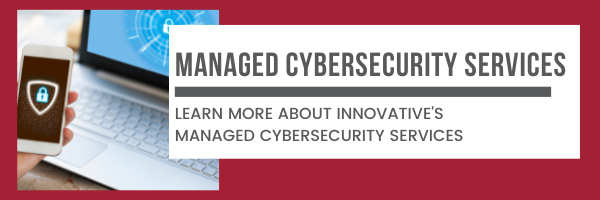Why your small business is a prime target for cyber threats
You probably have a lot on your plate when running your small business. Each day brings new challenges, and there isn’t a ton of time to sit down and worry about your cybersecurity strategy. You’re a small business, so why would anyone want to hack you? Wouldn’t they be better off going after a large corporation with loads of cash and data?
Not quite.
The scary truth is that every business, big or small, needs to take proper cybersecurity measures. No one is immune. In fact, small businesses are a pretty common target.
According to the 2019 Verizon Data Breach Investigations Report, small businesses were the top target for criminals and represented 43 percent of all data breaches. So, you might be asking why this is the case when larger businesses would make more “valuable” targets.
Today, we’ll talk about why your small business could still be targeted, why you only hear about the big incidents and what you can do to protect your business and its data.
Please be aware that while we are an IT company that offers managed cybersecurity services, this article is not a sales pitch. These are very real issues facing small businesses today, and we’re all going to be better off with proper cybersecurity measures, whether that’s with us or another managed service provider (MSP).
Why would my small business be a target?
For starters, it’s not likely that someone out there has found your business specifically and is now trying to hack you. Cyber attackers will use a “spray and pray” method for small businesses because their cybersecurity or IT infrastructure is likely less sophisticated than that of a larger business.
They’re counting on businesses like yours to let your guard down and assume you’re not worth targeting. Unfortunately, when they use these methods, it doesn’t matter to them how valuable or successful your business is. If they have a way in, they’ll take it because they can access and steal valuable data.
That’s not to say there aren’t still targeted cyberattacks on larger or more valuable businesses; it’s just more likely that small businesses will face the kinds of threats we’re talking about here.
Think of it like this: There’s a huge concert down the street, which means a parking lot full of unattended cars. Are thieves more likely to analyze each vehicle and only break into the more valuable ones? Probably not. They don’t have that kind of time, and they’ll almost certainly run into a lot of locked doors and alarms.
Instead, the thieves quickly move from car to car, pulling on door handles and hoping that some are left unlocked. One of the cars might be unassuming, old or even in rough shape, but if that door is unlocked and the owner’s belongings are left inside, you can bet they’re going to take advantage. Spray and pray.
Why do I only hear about the big cybersecurity incidents?
If you’re wondering why you never hear about cyber attacks on small businesses like yours in the news, frankly, it’s because they just aren’t covered. The news will focus on larger stories affecting larger businesses or corporations, one of the most prominent examples of this being the ransomware attack on Colonial Pipeline back in 2021.
We primarily rely on studies like the Verizon Data Breach Investigations Report mentioned above to learn more about cybersecurity and its impact on small businesses. Resources like this are great for highlighting the need for strong cybersecurity while also explaining the perception of small businesses and why they might feel immune or less at risk from cyber incidents.
Remember, just because you aren’t hearing much about it doesn’t mean it’s not happening. A major bank robbery will likely make the news; an individual car break-in probably won’t. Regardless, both victims in these situations likely faced significant losses at their own scales.
What can I do to protect my business?
Now that we know small businesses are at risk and why, it’s time to act. Every business might be starting this journey at a different point. Above all, we can recommend good IT best practices and an accountable IT partner, whether internal or external. Once you have that foundation under you, you can discuss cybersecurity measures your business can take.
Managed two-factor authentication (2FA), properly configured firewalls, and data backups are great ways to start safeguarding your business. From there, you can move to more advanced solutions that actively monitor for threats, helping to ensure your small business keeps its data secure.
Of course, we would never recommend implementing these changes without the help of a trusted IT expert who can be held accountable for the results.
Proactive investment in your business
It might be tough to think about your small business being the target of a cyber-attack, but that’s the harsh reality we live in. It’s vital that we invest in our technology proactively, as the losses from a cybersecurity incident can be sizable and damaging. There’s no need to panic, though. With a trusted IT partner at your side, you can navigate this cybersecurity journey together so your business can leverage technology and thrive.





